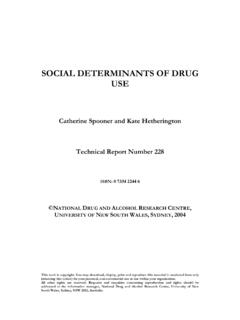Transcription of PESTEL Analysis of External Environment as a Success ...
1 96 PESTEL Analysis of External Environment as a Success Factor of startup business Ivana Marinovic MatovicAddiko Bank AD, Belgrade, Serbia, ABSTRACT: The objective of this paper is to present the purpose of PESTEL Analysis as a critical factor for startup Success . It proposes the use of PESTEL Analysis as a tool to evaluate the business Environment for startup organizations, with emphasis on the most common challenges faced by startups in conducting a PESTEL assessment. The main goal of the paper is to provide an overview of the situation, identify areas of importance for improvement, and define guidelines for startup business , with the aim of increasing competitiveness.
2 Contribution of the paper is theoretical and empirical, in the specific context of PESTEL Analysis for startup business . KEYWORDS: PESTEL Analysis , business Environment , start-up, organisation, entrepreneurship Introduction PESTEL provides a framework for a comprehensive Analysis of the Environment in which organization operates, and for creating possible business strategies. PESTEL Analysis is used for strategic planning, marketing planning, new product/service development and research (Vasileva, 2018). Thus, PESTEL Analysis deals with the Environment through the Analysis of political, economic, social, technological, ecological and legal/legislative factors (Kolios & Read, 2013).
3 It is necessary to clearly define the goal of PESTEL Analysis and to define all aspects of External Environment that are the subject of Analysis . Environmental factors should be analyzed from the aspect of business organization as a whole, from the aspect of products/services offered, taking into account organizational strategy. The subject of PESTEL Analysis should be clearly defined from the aspect of local market of organization, from the aspect of entry strategy at a new market, or launching a new product. PESTEL Analysis is also important for a potential takeover, a potential partnership, or a potential investment opportunity.
4 PESTEL Analysis is of special importance when establishing a new startup organization, for starting a business , when more markets are analyzed and their potential compared. The starting point should be an assumption that startup is a young organization, that develops either an existing or a completely new, never-before-seen product (often based on the latest technologies), and where Success is very uncertain. The aim of the paper is to point out the importance of PESTEL model for External Environment Analysis , for a startup business in Republic of Serbia. The paper also analyses the most common challenges that startup organizations face, in the process of opportunities and threats Analysis , rising from political, economic, social, technological, ecological and legal Environment .
5 Literature review PESTEL Analysis is assessed as a prerequisite/mandatory method that allows identifying factors relevant to the business Environment and provides data and information that allow organizations within the analyzed Environment to predict the situation in order to adapt to new situation and develop competitiveness (Walsh 2005). PESTEL is an acronym for English words that describe External factors analyzed through this Analysis : political, economic, social, technological, ecological and legal factors DOI: CONFERENCE ON SCIENCE AND SOCIETY September 28-29, 2020 97 (Rastogi & Trivedi, 2016; Maksimovic et al.)
6 , 2019). PESTEL Analysis is one of the most important and unavoidable tools for assessing External impacts that every organization must apply, in order to analyze the situation and define guidelines and directions for improving and developing a development strategy (Shtal et al., 2018). This method is most suitable for application to the overall business Environment , and not to each individual organization of a business Environment , because the factors that appear in this approach are conceived in this way (Mack & Putzschel, 2014). In PESTEL Analysis , the evaluation of factors is performed individually, without evaluation of their interaction (Yuksel, 2012), so it is appropriate to apply PESTEL method in combination with some other methods from the domain of engineering or IT methods and tools (Tsangas et al.
7 , 2019). PESTEL Analysis is a tool used for Analysis and monitoring of External environmental factors with an impact on the organization (Christodoulou & Cullinane 2019). PESTEL Analysis enables identifying business opportunities and threats and adaptating to market changes in a timely manner. Indirectly, the results of PESTEL Analysis indicate opportunities and threats, that are later addressed in SWOT Analysis , as one of the basic tools for defining organizational strategy. The key dimensions of the Environment that are analyzed are (Kolios & Read, 2013): Political factors - When considering this aspect, priority should be given to answering questions related to the stability of the political situation in the market.
8 After that, the impact of local laws and regulations on business , then business ethics, taxes, fees, customs and other state contributions that differ from state to state are considered. Besides, the labor law and its functionality, market barriers, health issues, and tax policy should be considered in this domain. Economic factors - From the economic point of view, the impact on business should be observed through the way of financing offered by banks, interest rates in individual countries, exchange rate, quality costs, inflation rate, price and quality of labor and energy. The overall road infrastructure has a significant impact in this domain, such as the existence and proximity of highways, proximity and functionality of ports, airport and railway infrastructure and the like.
9 Income factors per capita are most often considered as economic factors , although in some cases it is also considered as a part of social factors . Social factors - This set of factors has a very significant impact on the overall assessment. It is first necessary to give answers to the influence of the most basic social factors , such as: demographic structure, religious influence, national culture, level of education, structure of education, and the like. In addition, these factors include the protection and safety at work, life insurance, pension insurance and others. Technological factors - In today's business conditions, characterized by the intensive use and availability of IT tools, this area is of particular importance.
10 Technological factors cannot be observed only at the level of availability of various technologies, but also in terms of the existence of infrastructure for the necessary support of modern systems. Through this area, most often considered are the following: level of technology development, innovation, amortization, level of equipment flexibility, automation level, technological motivation, rate of technological changes, technological development strategies, existence and functionality of technology parks, and the like. Ecological factors - When considering ecological factors , the most important are: the quality of human attitudes towards natural resources; biodiversity; recycling of raw materials; control and minimization of air, soil and water pollution.








